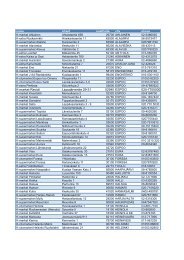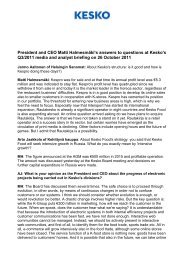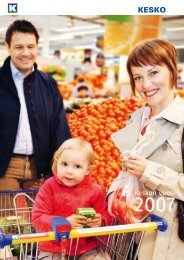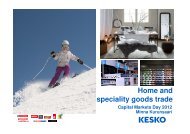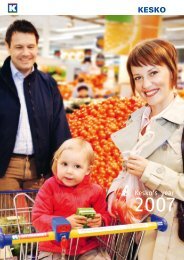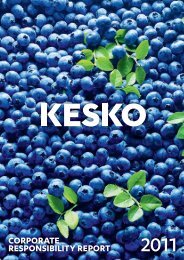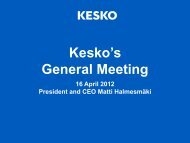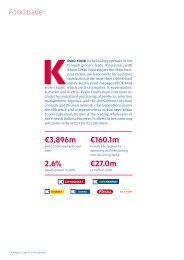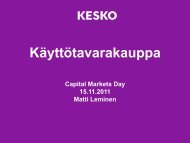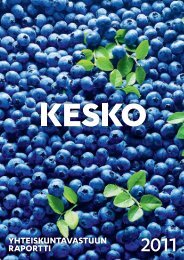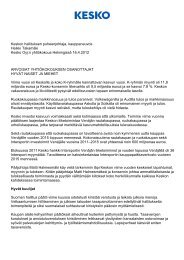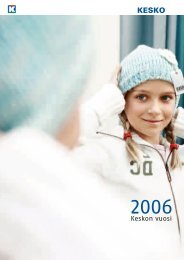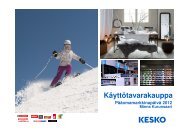Kesko's Annual Report 2009
Kesko's Annual Report 2009
Kesko's Annual Report 2009
You also want an ePaper? Increase the reach of your titles
YUMPU automatically turns print PDFs into web optimized ePapers that Google loves.
compare the responsibility practices of<br />
factories on site with Kesko’s requirements,<br />
decide on any required corrective<br />
actions and give support to factories<br />
implementing these corrective actions.<br />
Compliance with chemical regulations<br />
defined by Kesko is also verified during<br />
these visits.<br />
The goal of monitoring is always an<br />
independent audit, carried out according<br />
to either the BSCI audit model or the<br />
SA8000 standard. The objective of Kesko,<br />
such as all BSCI members, is to do business<br />
in the so-called high-risk countries<br />
only with suppliers who have passed the<br />
audit. At the end of <strong>2009</strong>, audits had<br />
been carried out in 107 of the factories of<br />
Kesko’s high-risk suppliers, compared<br />
with 32 the year before. More than 40<br />
Kesko’s suppliers participated in the<br />
training events arranged by the BSCI in<br />
China, Vietnam, Bangladesh and Turkey.<br />
Suppliers’ audit information is collected<br />
in the database developed by<br />
Kesko for this purpose. In addition to BSCI<br />
audited suppliers, Kesko had 30 suppliers<br />
with SA8000 certification and 112 suppliers<br />
of Fairtrade products. In all, Kesko has<br />
participated in ensuring decent working<br />
conditions and terms for workers of some<br />
250 companies in developing countries.<br />
Responsibility in<br />
the product trade<br />
Kesko’s division parent companies have<br />
several sustainable sourcing policies concerning<br />
the origins and production conditions<br />
which affect the creation of selections<br />
and promote the sales of the products<br />
in question.<br />
The selection and marketing policies<br />
concerning organic and Fairtrade products<br />
and products with environmental labelling<br />
are included in the K-food stores’<br />
chain concepts. Kesko’s statement on fish<br />
and shellfish purchases relies on the<br />
guidelines of the WWF for products from<br />
nearby areas and on the guidelines of the<br />
Marine Conservation Society for products<br />
from further away.<br />
In the development of Pirkka products,<br />
the focus is on promoting a healthy way<br />
of life, like in other marketing. The K-citymarket<br />
chain has launched to the market<br />
clothing collections that are based on the<br />
Global Organic Textile Standard or made of<br />
recycled plastic material.<br />
Rautakesko offers a wide selection of<br />
products with environmental, energy or<br />
emission category labelling. The proportion<br />
of certified timber out of total timber<br />
sales exceeded 90%. Garden furniture<br />
sold by all K-Group stores is either FSCcertified<br />
or made of sustainably cultivated<br />
tropical wood species.<br />
Product safety<br />
Kesko Food’s Pirkka Product Research is<br />
responsible for ensuring the quality of<br />
purchases, keeping abreast of food legislation,<br />
maintaining and providing support<br />
for the self-control plans required by law<br />
and for developing own brand products<br />
together with the purchasing and marketing<br />
units.<br />
Quality control is carried out by auditing<br />
the operations of product manufacturers<br />
and analysing product composition<br />
and quality. In 2008, the Pirkka Product<br />
Research Unit’s laboratory became the<br />
first laboratory representing the Finnish<br />
trading sector with the ISO 17025 accreditation.<br />
In <strong>2009</strong>, the Product Research audited<br />
41 suppliers, of which nine were Finnish.<br />
Most of them were manufacturers of Kesko’s<br />
own brand products. A total of 5,702<br />
food novelties and product development<br />
samples were analysed, while the total<br />
number of batch control and other selfcontrol<br />
samples was 1,393.<br />
The Product Research Unit also plays a<br />
key role in exceptional situations, when a<br />
product launched on the market deviates<br />
from quality or safety requirements. During<br />
the year, there were 61 product recalls<br />
(66 in the previous year), most of which<br />
related to defective quality or taste, or to<br />
a defect in manufacturing or packaging.<br />
21 of the recall cases were Kesko’s own<br />
brands; in other cases the Product<br />
Research Unit assisted manufacturing<br />
industry. Three of the recall cases were<br />
public recalls, involving potential health<br />
hazards.<br />
During the year, the recipe service of<br />
the K-test kitchen, which changed its<br />
name to the Pirkka test kitchen to celebrate<br />
its 50th anniversary, produced 620<br />
recipes for both the K-Group units and<br />
directly for consumers. Kesko Food’s Consumer<br />
Service answers consumer inquiries<br />
and receives feedback. In <strong>2009</strong>, there<br />
were 20,999 such contacts.<br />
Kesko’s year <strong>2009</strong><br />
53<br />
New signs at K-food stores<br />
illuminated with LEDs<br />
LED lighting technology is replacing<br />
neon and fluorescent tubes in signage<br />
at K-food stores. The benefits of LED<br />
lighting include the following:<br />
• Energy consumption is 60–80%<br />
lower<br />
• Reduced need for maintenance<br />
work for illuminated advertising<br />
and, as a consequence, less travel<br />
• Life-spans of LED lights are over<br />
10 years<br />
• Over time, LED lights dim<br />
considerably less than neon and<br />
fluorescent tubes<br />
• Advertising with LED lighting<br />
contains no hazardous waste.<br />
A monitoring team controls<br />
the responsibility of Chinese<br />
suppliers<br />
Kesko’s monitoring team in Shanghai,<br />
China guides, trains and monitors<br />
Chinese suppliers of Kesko’s division<br />
parent companies. Monitoring officers<br />
Angel Yang and Buick Bie help suppliers<br />
correct any deficiencies found.<br />
Monitoring also helps suppliers<br />
develop their operations and apply for<br />
a BSCI audit or SA8000 certification.<br />
Monitoring in China started in<br />
October 2008. The monitoring team<br />
made 161 factory visits to the<br />
premises of 50 suppliers in <strong>2009</strong>.



